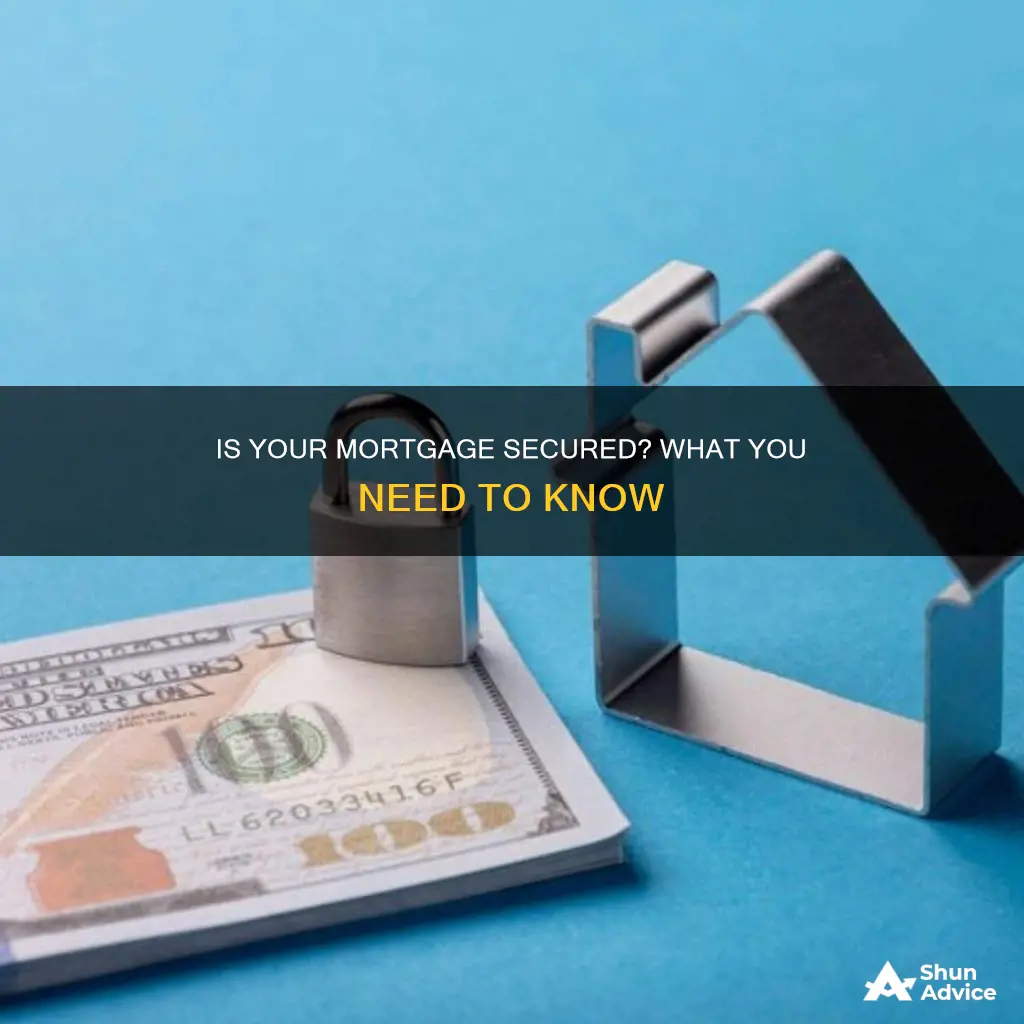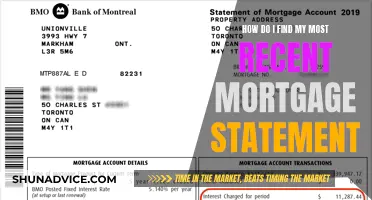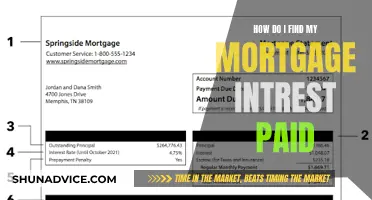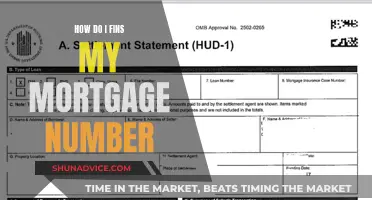
Mortgages are a type of secured loan, which means they are backed by collateral that the lender can collect if the borrower defaults on the loan. In the case of a mortgage, the collateral is the house being purchased. This means that if the borrower cannot make their monthly payments, the lender has the right to seize and sell the house to pay back the loan. Secured loans are considered less risky for the lender, and they often feature lower interest rates and higher borrowing limits than unsecured loans.
| Characteristics | Values |
|---|---|
| Type of loan | Secured loan |
| Collateral required | Yes |
| Examples of collateral | Car, home, money in a savings account, property |
| Lender's recourse if borrower defaults | Seize and sell the collateral |
| Risk to lender | Lower |
| Interest rates | Lower |
| Ease of qualification | Easier |
| Repayment terms | Longer |
What You'll Learn

Mortgages are a type of secured loan
A loan is secured when a lender accepts a valuable asset, such as a car or house, as collateral. This means that if the borrower fails to make their monthly payments, the lender has the right to seize and sell the collateral to pay back the loan. Mortgages are a type of secured loan, with the house or property being used as collateral. This means that if the borrower defaults on their mortgage payments, the lender can seize and sell the house to recoup the unpaid loan balance.
Secured loans are typically viewed as less risky for the lender, as they provide extra security that the loan will be repaid. As a result, secured loans tend to have lower interest rates and higher borrowing limits than unsecured loans. They also tend to have longer repayment terms, with secured mortgage loans allowing for repayment periods of up to 30 years. Additionally, secured loans may be easier to qualify for than unsecured loans due to the reduced risk for the lender.
When applying for a secured loan, the lender will need to know which asset the borrower plans to use as collateral. The lender will then place a lien on that asset, giving them the legal right to seize and sell it if the borrower defaults on the loan. It is important for borrowers to understand the risks involved in taking out a secured loan, as they could lose their assets if they are unable to make the required payments.
To determine if a loan is secured or unsecured, borrowers can check their loan application, which will state whether collateral is required. Borrowers can also compare their loan terms to those of typical secured and unsecured loans, as secured loans generally offer more lenient qualifications, lower interest rates, higher borrowing limits, and longer repayment terms. However, it is important to note that specific laws and regulations, such as New York's homestead protection law, may provide some protection for borrowers in the event of default on a secured loan.
Freddie Mac: Who Owns Your Mortgage and How to Know?
You may want to see also

Collateral is required for secured loans
A secured loan is backed by collateral, which is an asset that a lender accepts as security for extending a loan. In other words, collateral is something of value that a borrower pledges as security for a loan. The item that backs the loan is called collateral. The lender has the right to seize the collateral if the borrower can't repay the loan. The lender's claim to a borrower's collateral is called a lien—a legal right or claim against an asset to satisfy a debt.
Collateral can be any asset roughly equal in value to the amount being borrowed, such as a car, home, or money in a savings account. The type of asset you can use as collateral depends on what type of secured loan you’re getting. For example, you’ll use your home as collateral for a mortgage and your car as collateral for an auto loan. With other types of secured loans, you might be able to use bank accounts, investments, insurance policies, collectibles, or other valuables.
Mortgages are secured loans. That means that they are backed by collateral that the lender can collect if the borrower defaults on the loan – in this case, the house. In a mortgage, the value of your collateral is directly reflected in the loan-to-value (LTV) ratio the lender assigns to your loan. In general, the higher your LTV ratio, the more you can expect to pay in interest and closing costs. You’ll also need a larger down payment.
Secured loans can feature lower interest rates, higher borrowing limits, longer repayment terms, and easier qualification requirements than unsecured loans because they give the lender more financial security. Lenders consider unsecured loans riskier than secured loans because they can only rely on a check of the borrower's credit score and their agreement to repay the loan.
Finding Your Wells Fargo Mortgage Account Number: A Guide
You may want to see also

Lenders can repossess collateral if you can't repay
A mortgage is a secured loan. This means that it is backed by collateral, which the lender can collect if the borrower defaults on the loan. In the case of a mortgage, the collateral is the house. If you default on your mortgage, the lender has the right to repossess your home. They can then sell your home to recover the money you owe. If the outstanding loan balance is more than the sale price, you may be held responsible for paying the difference, plus the creditor's repossession expenses.
Lenders can also repossess other types of collateral, such as cars, if you can't repay a secured loan. For example, if you take out an auto loan to buy a car, the car itself is usually the collateral. If you default on the loan, the lender can repossess the car and sell it to recover the money you owe. Similarly, if you use a bank account, investment, insurance policy, or collectible as collateral for a secured loan, the lender may have the right to seize and sell these assets if you can't repay the loan.
It's important to note that the specific laws and processes for repossession can vary from state to state. In most states, creditors can repossess secured property without first suing you or obtaining a court judgment. However, there are some exceptions. For example, in some states, lenders may need to take you to court before repossessing your home in the case of a defaulted mortgage. Additionally, creditors are generally not allowed to use physical force or breach the peace when repossessing property. If they do, you may be able to file a lawsuit against them.
Before taking out a secured loan, it's important to carefully consider the risks involved. You should also review the loan agreement carefully to understand what will happen if you are unable to make your payments. If you think you may have trouble making payments on a secured loan, it's a good idea to communicate proactively with your lender. They may be willing to work with you to find a solution that avoids repossession.
Who Owns Your Mortgage? Trace Your Mortgage Backers
You may want to see also

Unsecured loans don't require collateral
A mortgage is a secured loan. This means that it is backed by collateral that the lender can collect if the borrower defaults on the loan, such as a house.
Unsecured loans, on the other hand, do not require collateral. Instead, they are backed only by the borrower's creditworthiness and promise to repay the loan. This means that the lender will consider your credit score, existing debts, income, and other factors about you on a personal loan application. Lenders will also use your credit history to decide whether you qualify for an unsecured loan and, if so, what interest rates you'll get.
Unsecured loans are considered riskier for lenders, so they require higher credit scores for approval. If a borrower defaults on an unsecured loan, the lender may commission a collection agency to collect the debt or take the borrower to court. The borrower's credit score will be negatively impacted, making it harder to get a loan in the future.
Common types of unsecured loans include personal loans, student loans, and credit cards. Unsecured personal loans generally range from about $1,000 to $50,000, with some lenders offering up to $100,000. They are typically repaid in fixed monthly payments over a set period, such as two to five years.
It is important to note that payday lenders and companies that offer merchant cash advances do not offer secured loans in the traditional sense. While their loans are not secured by tangible collateral, they take other measures to secure repayment, such as requiring borrowers to provide post-dated checks or agree to automatic withdrawals from their checking accounts.
Accessing Your Mortgage Statement: A Quick Guide
You may want to see also

Secured loans have lower interest rates
A secured loan is a loan that is backed by collateral, which could be any asset roughly equal in value to the amount being borrowed. This can include a car, home, or money in a savings account. The collateral can be seized by the lender as compensation if the borrower fails to make payments on the loan.
In contrast, unsecured loans are riskier for lenders because they are not backed by collateral. As a result, lenders rely solely on a borrower's credit score and agreement to repay the loan. Because of this increased risk, lenders typically charge higher interest rates for unsecured loans.
The lower interest rates of secured loans can make them a good option for borrowers who are confident in their ability to make timely payments. However, it is important to carefully consider whether you will be able to keep up with the payments, as failing to make payments on a secured loan can result in the loss of the asset used as collateral.
In addition to lower interest rates, secured loans may also offer higher borrowing limits, longer repayment terms, and easier qualification requirements compared to unsecured loans.
Refinancing Your Mortgage: A Guide to Navigating the Process
You may want to see also
Frequently asked questions
Your mortgage is a secured loan if it is backed by collateral, which in this case is the house. If you default on your loan, the lender can take your house and sell it to recoup the unpaid loan balance.
A secured loan is backed by collateral, which can be any asset roughly equal in value to the amount being borrowed, such as a car, home, or money in a savings account. An unsecured loan does not require collateral, and is therefore deemed riskier and comes with higher interest rates.
Secured loans can feature lower interest rates, higher borrowing limits, longer repayment terms, and easier qualification requirements than unsecured loans because they give the lender more financial security.







